Taj Mahal, the Indian icon and one of the Seven Wonders of the World, and a UNESCO Heritage site frequented by millions of visitors each year. The Taj Mahal is definitely one of the most beautiful buildings in the world!
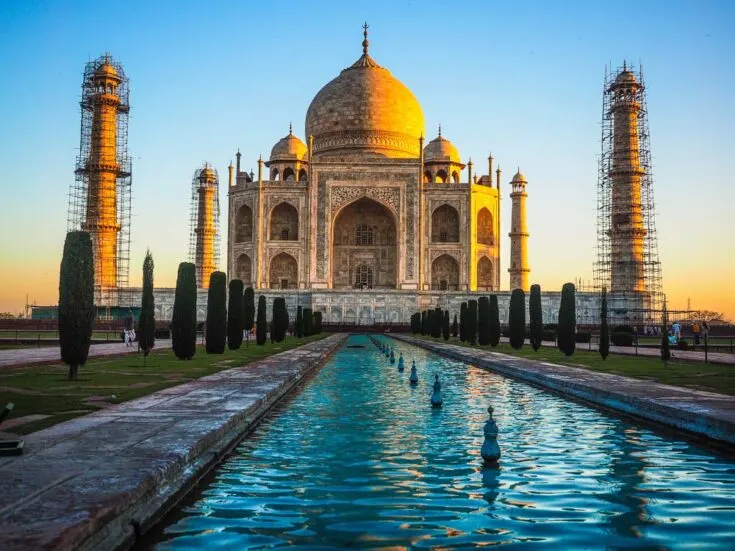
Located on the right bank of Yamuna River in the city of Agra in Uttar Pradesh, the site encompasses almost 17 hectares of land dotted with lush gardens, crystalline pools, and labyrinth pathways.
A symbol of both power and love, the glistening white marble mausoleum is one of the most impressive buildings you will ever see.
A revered jewel of Indo-Islamic architecture, the complex contains a mosque, tombs, guest houses, cloisters, and courtyards – its marble work infused with ancient scripts, carvings, and storytelling reliefs.
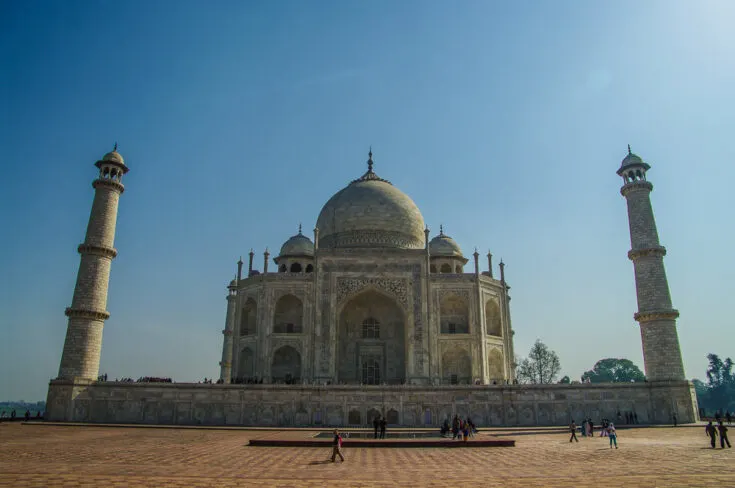
Constructed between 1631 and 1648, the perfectly symmetrical Taj Mahal took over 20 thousand workers to complete, which included stone-cutters, masons, calligraphers, dome builders, and painters who travelled from Central Asia and especially Samarkand in Uzbekistan and the Middle East just to work on it.
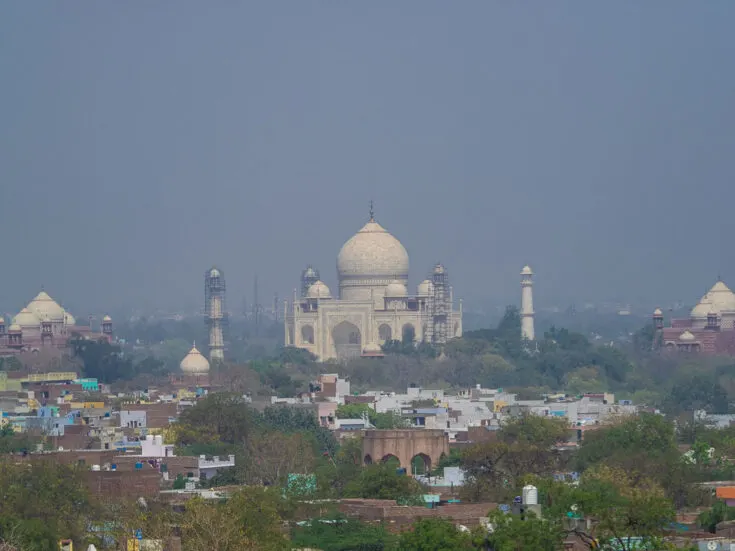
NB. The photos in this post are from 3 different trips to Agra and India.
And locally, the locals just call the Taj Mahal the Taj, with skipping Mahal. It´s just the Taj.
But why was the Taj Mahal built?
When his beloved wife and trusted advisor Mumtaz Mahal passed away, Mughal Emperor Shah Jahan built the white marble mausoleum in her honour, and even today, centuries later, thanks to strict management and protection regulations, it remains almost as pristine as the day it was unveiled.
The Taj Mahal is a must-visit for any visitor to India, so here are some top tips on how to reach Agra and a travel guide to the Taj Mahal so that you don’t miss a single thing!
There are two kinds of people in the world.
Bill Clinton
Those who have seen the Taj Mahal and love it, and those who have not seen the Taj Mahal and love it.
What To See In and Around the Taj Mahal
For the ultimate experience and to learn more about the heritage and architecture of the Taj Mahal, it’s wise to pre-book a guided tour or download a dedicated app to navigate your way around the buildings and gardens easily.
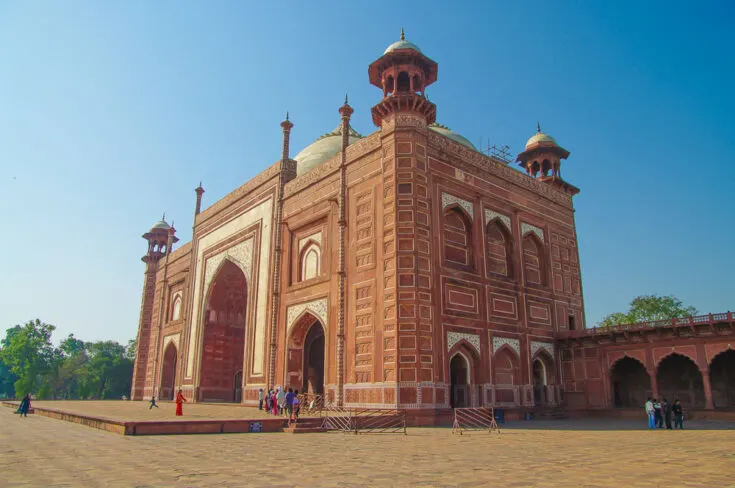
Four minarets flank the exterior domed tomb, and a tranquil, crystalline oblong pool sits in front of the main building, the marble façade of the Taj Mahal reflecting in its waters.
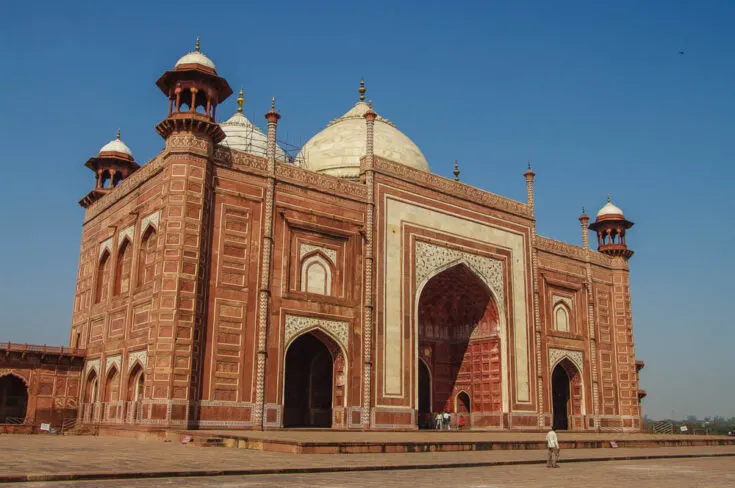
Landscaped gardens with sculpted trees are divided into quadrants, and there is a guesthouse and mosque in the grounds.
Inside, the intricate detailing of the chambers are simply inlaid with precious stones and lattice work, offering great insight into the decades of work that went into the building.
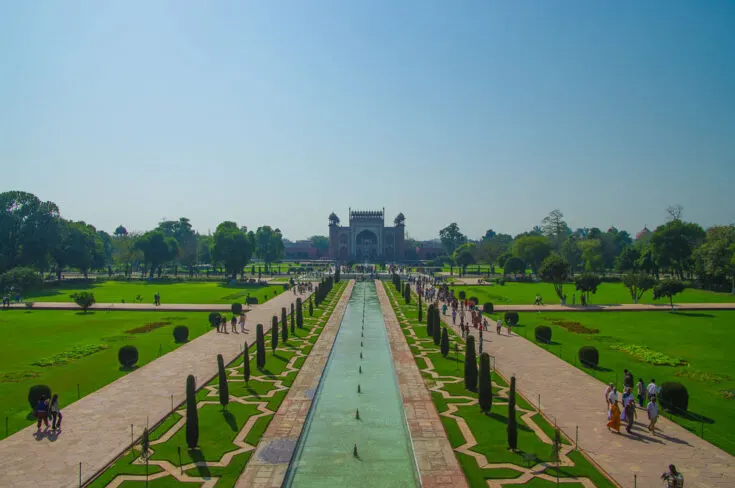
The Best Views are from Mehtab Bagh Garden
Mehtab Bagh or “Moonlight Garden”,”north of the Taj Mahal, across Yamuna River, offers the best vistas of the structure. This is the best place in Agra to take a picture of the Taj Mahal, which is outside the complex itself.
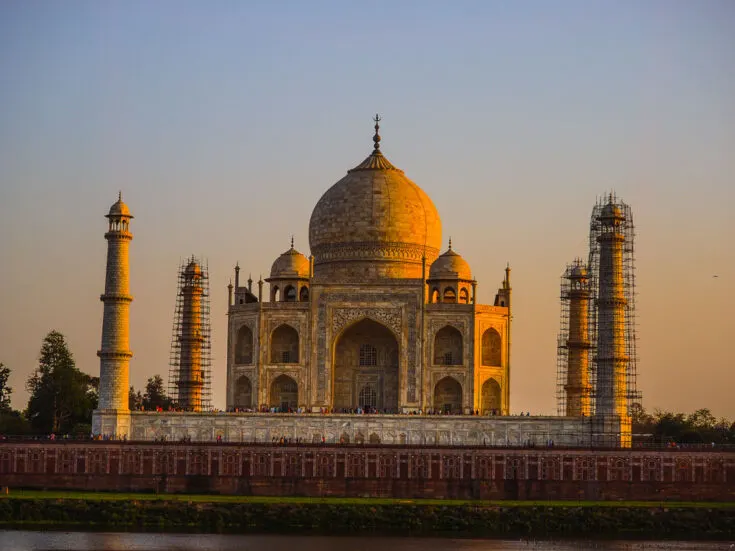
This Charbagh complex is laid out with four corners to symbolize the four gardens of Paradise.
Although the gardens were originally built by the Emperor with lavish pavilions, ponds, and fountains, today, it remains in a simple state with flowering shrubs, trees, grass, and birdlife to admire.
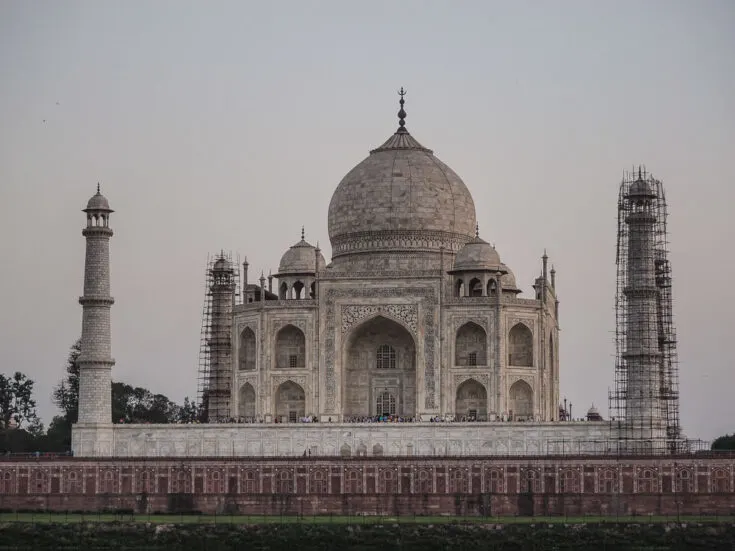
Mehtab Bagh is the perfect place to escape the crowds of Agra during all times of the day except around sunrise and sunset when everyone comes here to get a photo of the Taj. Then this park gets crowded too.
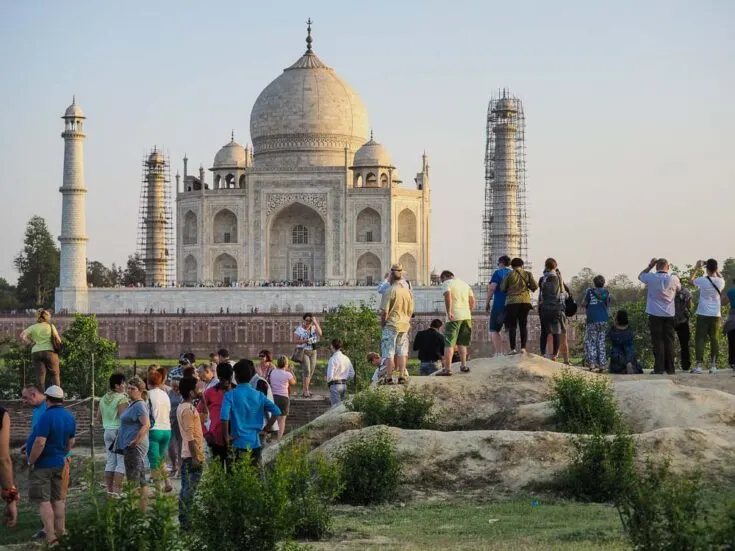
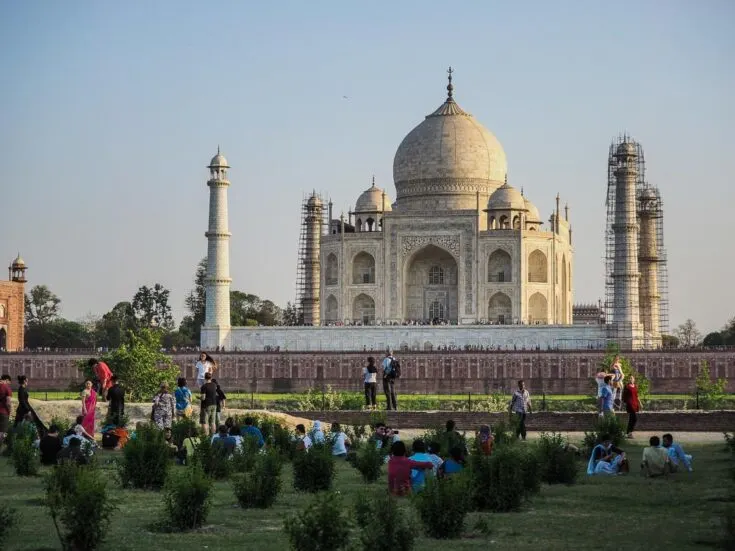
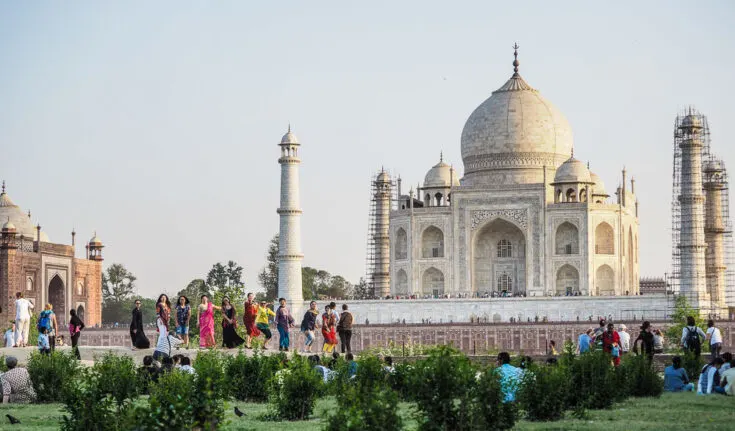
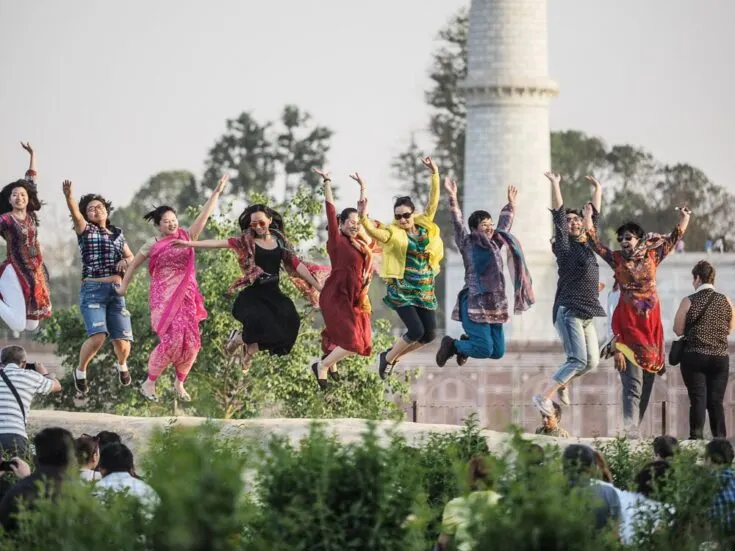
The entrance fee for foreigners is 100 Rs, and it’s open from sunrise to about 18.00 (they will tell you that’s it’s open until sunset, but around 18.00 the guards seem ready to go home and decide to close down the park).
A rickshaw return trip will cost you 200 – 300 Rs from the city centre to Mehtab Bagh. It´s way too far to walk here.
Take a Sunset Cruise
At sunrise or sunset, there’s no better way to see one of the world’s Seven Wonders than on a Yamuna River romantic riverboat cruise.
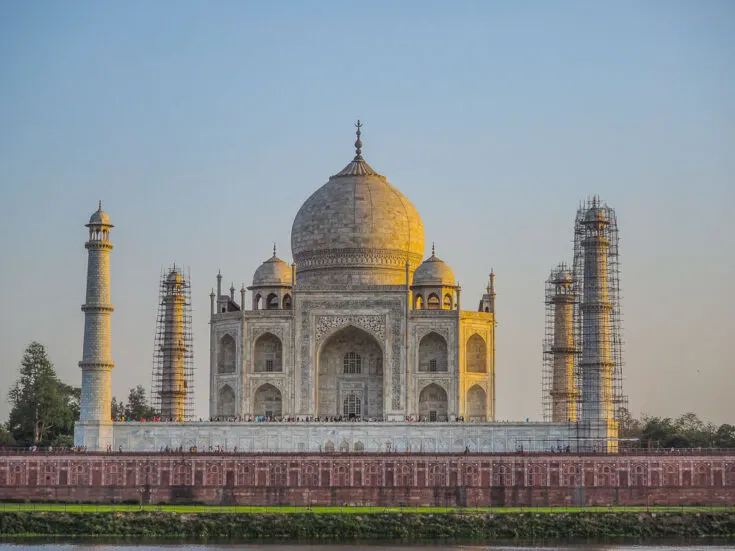
It’s a great way to beat the crowds and view the Taj Mahal and Mehtab Bagh from a different perspective.
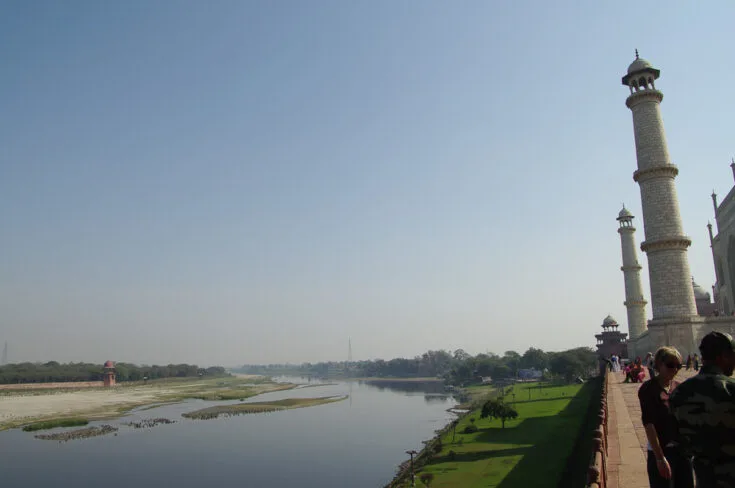
Visit Agra Fort
Sixteenth-century Agra Fort is also located on the right bank of Agra’s Yamuna River.
The red sandstone fortress was previously a royal residence and military base and served as the government seat during the time when Agra was the Mughal capital.
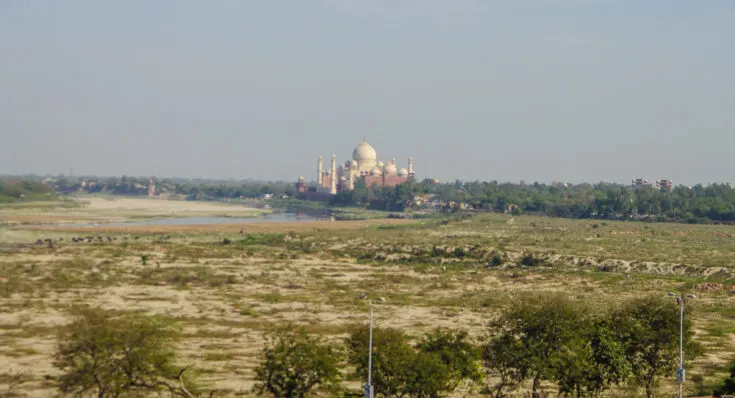
Designated as a UNESCO World Heritage Site in the 1980s, the fort was commissioned by Emperor Akbar in 1565 and took around 8 years to build.
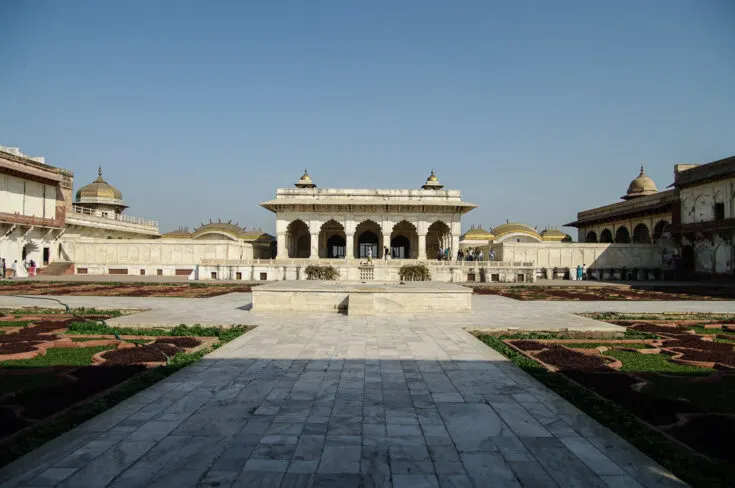
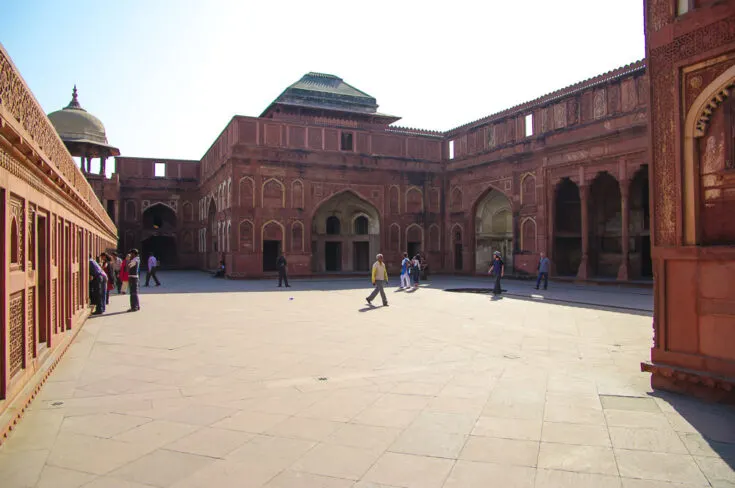
The huge crescent-shaped structure has a circumference of 2.5 km with south and west-facing gates to enter and exit by.
The city-style fortress contains a complex filled with Persian and Timurid architectural buildings and boasts main attractions such as Jahāngīr’s Palace, The Pearl Mosque, Octagonal Tower, and the fascinating Palace of Mirrors.
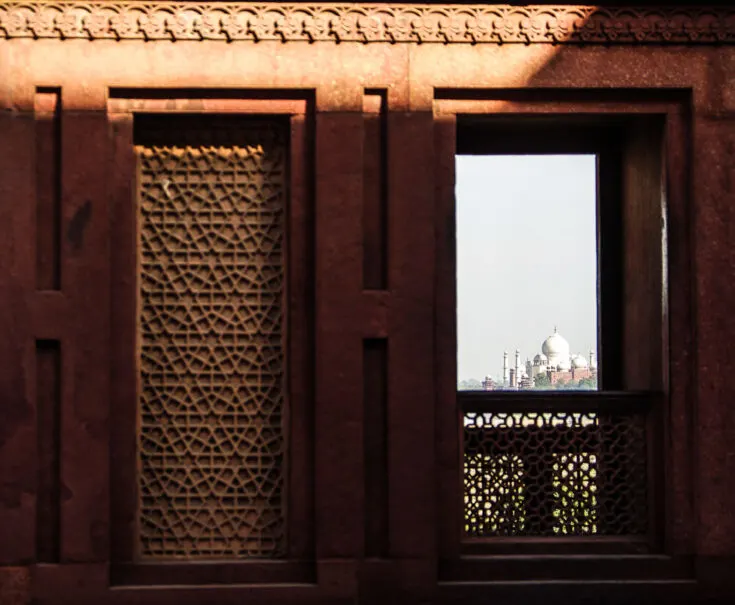
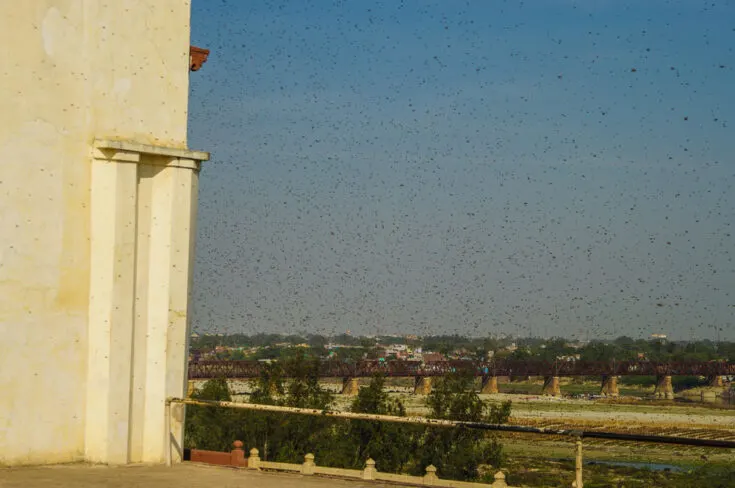
See the Baby Taj
Many visitors to the Taj Mahal haven’t even heard of Baby Taj.
This is the tomb of Itimad-ud-Daulah, a smaller, more modest structure which was the precursor to the Taj Mahal.
Although diminutive compared to its famous neighbour, Baby Taj is stunning inside with ornamental, colourful wall tiles and inlays which display stories and artefacts of historical significance.
The tomb doesn’t get many visitors, and you can take photos of the interior and exterior, making it a must-see attraction in Agra.
Best Times of Day to Visit the Taj Mahal
The Taj Mahal is one of India’s most popular tourist attractions; therefore, almost always busy with crowds.
Fortunately, you can avoid many people by accessing the Taj Mahal at sunrise, sunset, or on a full moon tour.
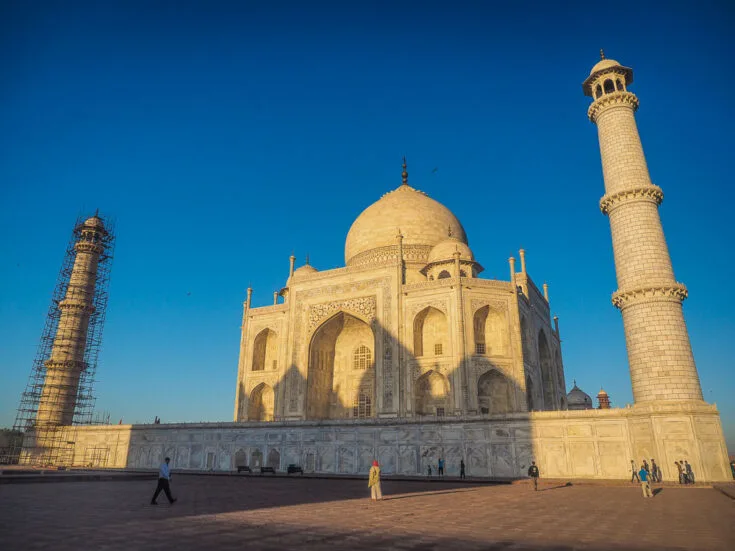
The Taj Mahal is closed on Fridays; weekends are busier too, so if planning a trip, opt to visit Monday to Thursday at sunrise or sunset.
There will be fewer people walking around so you can admire the mausoleum’s splendour in relative peace.
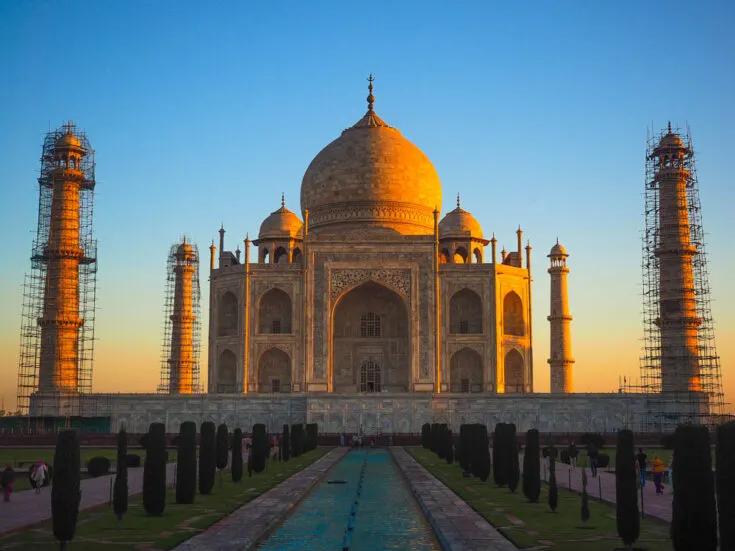
Best Time of Year to Visit the Taj Mahal
There is no “good” or “bad” time of year to visit the Taj Mahal, but those visiting during the summer months will have excessive heat to contend with!
Temperatures can reach well over 90 to 95 degrees Fahrenheit, so unless you plan an early morning or evening visit, it may become unbearable if you’re not used to the heat!
Generally, the cooler months between October to March are most popular to visit the Taj Mahal and the Golden Triangle.
The Daily temperatures are manageable and pleasant for exploring, ranging from 60 to 75 degrees Fahrenheit.
Taj Mahal is ovecrowded
All these photos were taken just about 30-40min AFTER the gates open. so you better be at the entrance early if you wish to get some pictures without crowds.
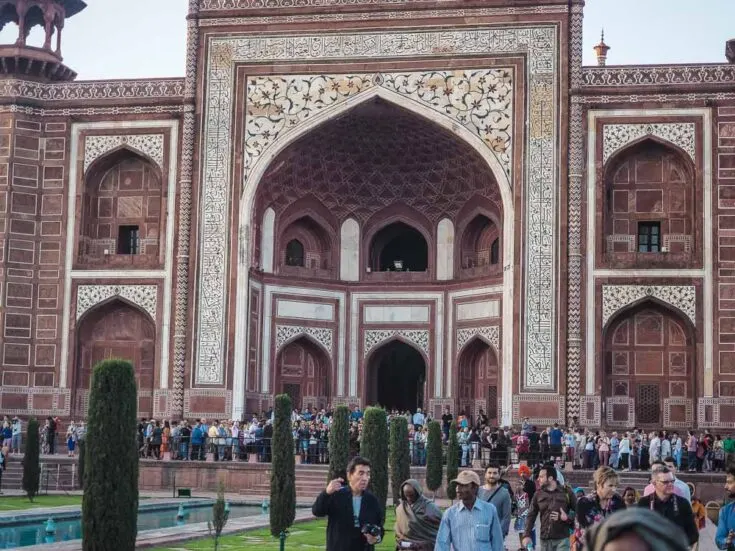
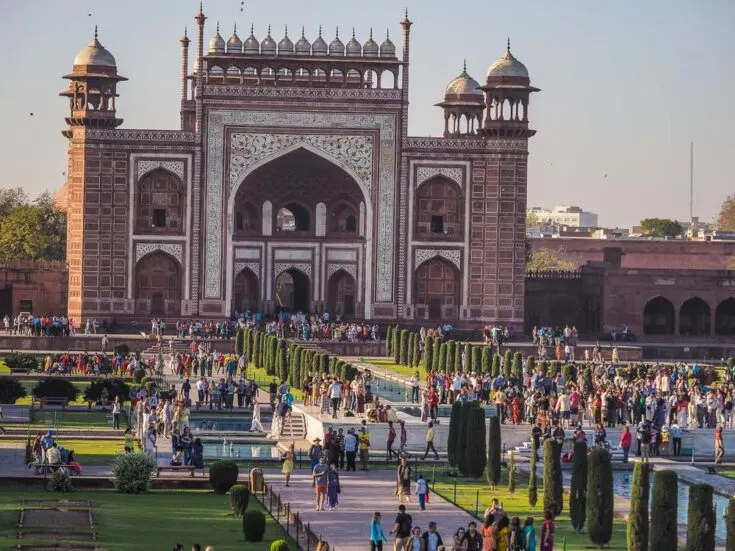
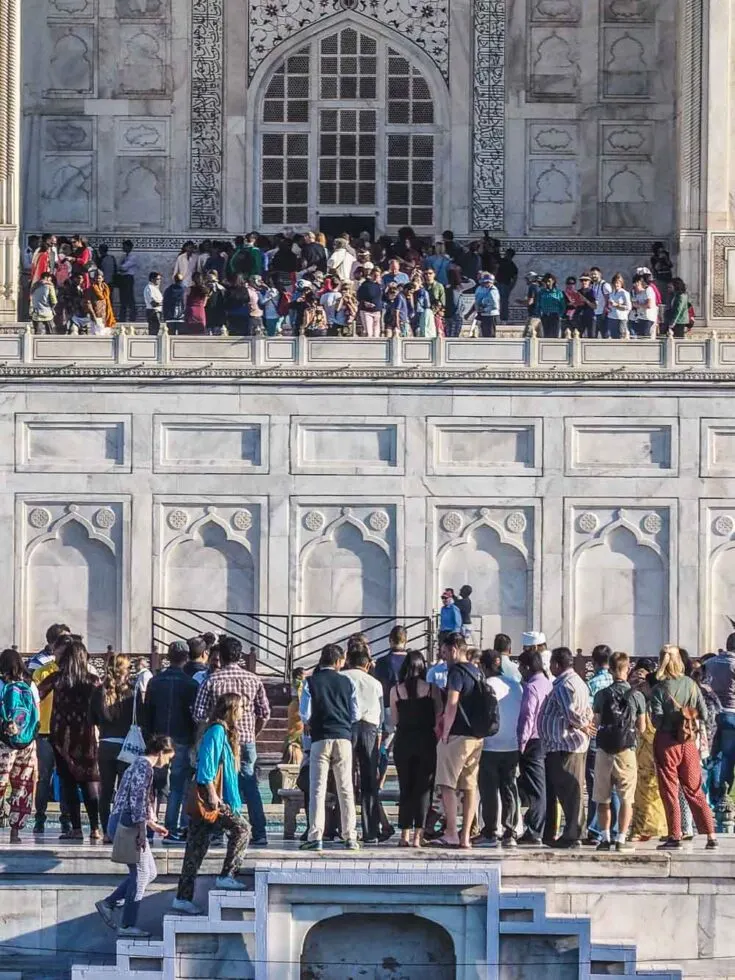
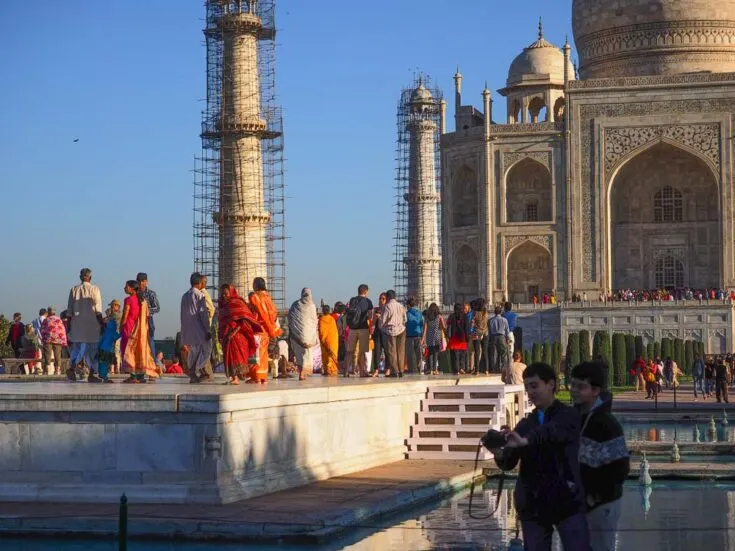
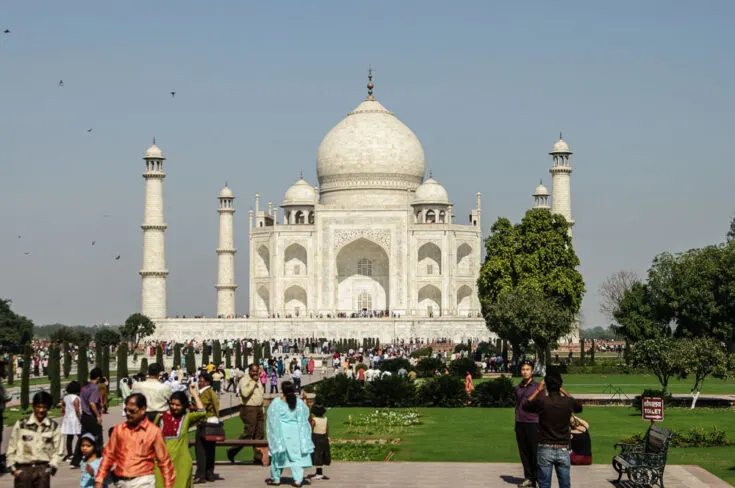
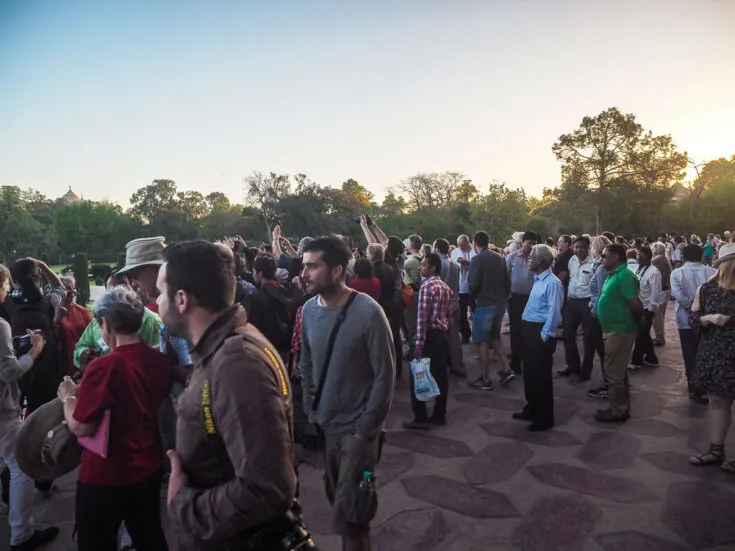
Top Tips for Visiting the Taj Mahal
Visiting the Taj Mahal can be straightforward, but there are a few things to be aware of prior to travel, so there are no unpleasant surprises when you get there! Here are our Top Tips for Visiting the Taj Mahal. But the main tip is, be early, you should be at the ticket gate an hour before the gates open if you wish to get photos of the Taj without crowds
Changing Colours of the Day
The Taj Mahal changes colour throughout the day; at sunrise, it may appear with a pinkish hue, transforming to dazzling white at midday, enveloping a tangerine shade at sunset to translucent blue at full moon.
If you seek a particular style of photograph, choose the time of day you visit wisely.
Dress in Bright Tones
You are allowed inside the majestic white marble structure; however, photographs are not permitted, and compared to the exterior, it’s simply decorated, so there’s not too much to see.
You can achieve some awesome snaps in and around the complex, though. Be sure to wear bright colours to make your pictures really stand out!
Three Entrance Gates
There are three separate entrances to the Taj Mahal – the East Gate (convenient and close to hotels and hostels), the West Gate – crowded for most of the day unless you arrive really early and the South Gate – which opens a little later than the others with an (expensive by Indian standards) tourist-driven souvenir market close by.
It’s also worth noting that men and women queue separately at the entrance gates, so don’t worry if you’re travelling as part of a couple; this is perfectly normal procedure in India.
Dress Code for the Taj Mahal
It’s advisable, especially for women, to dress accordingly, avoiding swimwear, strapless tops, and shorts.
In India, ladies usually cover their knees and shoulders as a sign of respect, and as it can get particularly hot at the Taj Mahal, it’s also sensible for all visitors, regardless of gender, to wear loose-fitting, lightweight clothing.
Be Aware: Some Items in your Backpack may be Banned!
There’s a long list of items you cannot take into the Taj Mahal, and your bag will be checked and scanned at the entrance gate to ensure you comply with the rules!
Things like camera tripods, bags, playing cards, headphones, and food are not permitted, and if you wish to film videos rather than still photography, you need to request permission and pay a small fee, so be sure to check prior to your visit. These rules are strictly enforced.
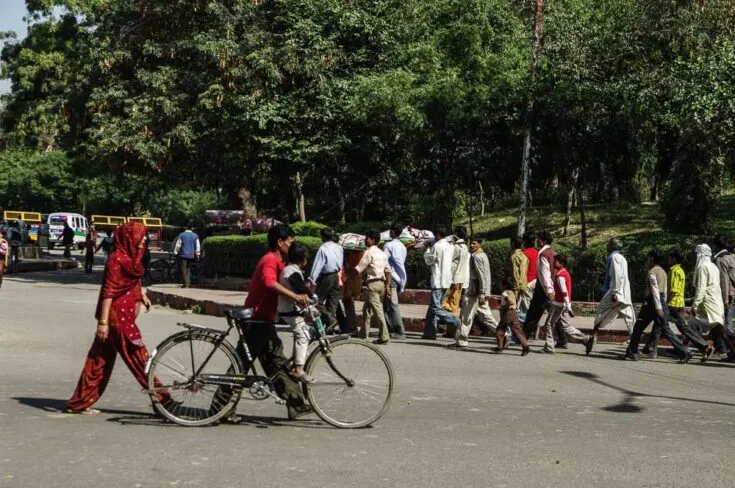
Be Prepared to Remove Your Shoes
Visitors planning to reach the top of the Taj Mahal must remove their footwear beforehand to prevent the delicate marble from damage.
Don’t fret, though; you don’t have to climb barefoot; foreign travellers get complimentary foot coverings to protect the soles of their feet on the hot marble flooring!
Entrence Ticket to Taj Mahal
The Ticket price for the Taj Mahal for foreigners is 1100RS and 50 RS for locals.
From the end of 2018, both domestic and foreign tourists will have to pay an extra 200RS if they want to enter inside the Taj Mahal to its main mausoleum. Which in my opinion is not really worth it.
Opening Hours For Taj Mahal
The Taj Mahal is open from 06:00 am to 18:30, with the ticket sale opening one hour before the gates open.
NB: Taj Mahal is closed every Friday trough out the year.
How to Get to the Taj Mahal
It’s easy to reach the Taj Mahal in Agra by car, bus, train, or airplane. It’s one of the main tourist hotspots of India. Therefore, there are plenty of public transport networks operating between the Golden Triangle cities of New Delhi and Jaipur to Agra.
Best Way to Get from New Delhi to Agra
The Taj Mahal in Agra sits around 200 kilometres south of New Delhi, the largest city and capital of India, and there are regular (and fast) trains that connect the capital with Agra.
Trains from New Delhi to Agra include the Shatabdi, Rajdhani, and the Gatimaan Express.
The latter runs six days a week except for Fridays and leaves Nizamuddin Station in New Delhi with a journey time of less than 2 hours.
Tickets can be purchased online prior to your day of travel or in person at the station. A full list of stations and their opening times are available at the India Rail website. The easiest is to go to the tourist ticket office on the second floor at New. Delhi railway station.
Guided Tours from New Delhi to the Taj Mahal
Alternatively, if you prefer to travel as part of a group and wish to have a local guide available to answer all of your tricky architectural questions, you may wish to book an All-Inclusive day trip from New Delhi to the Taj Mahal Agra Fort and Baby Taj through Viator.
Alternatively, reserve a glorious sunrise tour of the Taj Mahal via Get Your Guide.
Other Ways to Get to Agra from New Delhi
If you prefer to travel via other modes of transport, bus services, and government-authorized taxis and flights are also available.
Getting from Jaipur to Agra
It’s also relatively easy to travel from the “Pink City “of Jaipur to the Taj Mahal is around 4 hours by car and a similar time by train and bus.
There are several trains per day, with the fastest operating from Jaipur Junction Station to Agra Fort taking 3 hours and 50 minutes.
Guided Tours from Jaipur to Agra
If you are planning something a little different, perhaps a Responsible Travel Express Tour or a Golden Triangle Cycling Tour will tempt your adventurous spirit.
Alternatively, you can simply take a private full-day tour from Jaipur to the Taj Mahal, Agra Fort, and Fatehpur Sikri with Viator.
So, there you have it. A full guide to the Taj Mahal, what to see in and around Agra, and top tips for travel.
It’s a spectacular country with friendly people and architecture unseen elsewhere in the world, so I hope you enjoy your upcoming trip to this region of India and beyond!
How To Get Around Agra.
Agra is a spread-out city with a population of 1,7 million.
Unfortunately, there is no metro system – So like in most other Indian cities, Rickshaws (Tuk Tuks) are the main form of transportations. You should be able to hire a rickshaw with a driver for the whole day for around 400 – 600 Rs, but remember to haggle and to agree on the price before the end of the day.
If you got some spare time and want to see the mighty Bengal Tiger, be sure to head to Ranthambore National Park, which is just a few hours from Agra.
Where to stay in Agra
Agra is probably the city in India with the most guesthouses. As a result, the competition between guesthouses/hotels is huge.
If you use the amazing travel app “MakeMyTrip” to book your accommodation, will you be able to get some crazy deals (that sounds sponsored – but it’s not)!
I and my travel buddy were able to stay at a five* hotel with an all-you-can-eat breakfast – at a CHEAPER price than we would’ve paid for a bed in a dormitory, at a hostel.
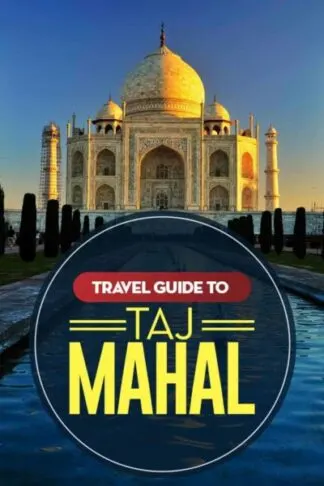

Aalin Tours
Thursday 26th of September 2019
Taj Mahal best to visit thanks for this post
Blogparade: Die schönsten Fotospots der Welt – und die Wahrheit dahinter
Friday 22nd of June 2018
[…] Extener Link: https://unusualtraveler.com/taj-mahal/ […]
Maria Ingrid
Monday 20th of March 2017
Your photos are great.. Hope I can also visit Taj Mahal soon.. Thanks for the wonderful tips by the way.. :)
xoxo, Maria Ingrid | www.wanderwithmi.com
Purvi K
Monday 20th of March 2017
This certainly is a masterpiece... Glad to know such amazing info about the Jewel of my country
Jen
Monday 20th of March 2017
Wow! Gorgeous photos! I hope to see it in person one day!!!